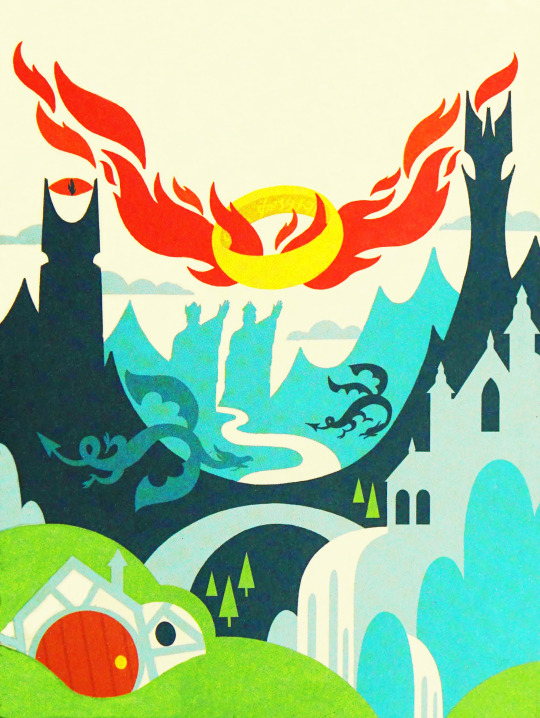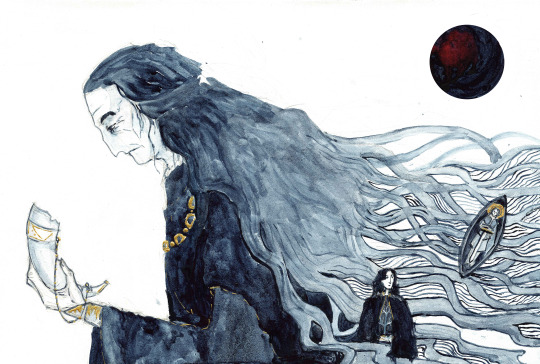#that John Ronald Reuel Tolkien
Explore tagged Tumblr posts
Text
Some Tolkien affirmations to help you along when the darkness seems too much and everything seems lost
"The world may be grim, but there's always hope. Even in the darkest of days, there may be one bright star to guide you."
—Elrond
"It is not despair, but only the handing on of a torch."
—Aragorn
"The greatest good returns at last to those who share it freely."
—Gandalf
"It is not by sorrow and by suffering that we grow. It is by the choice we make when faced with sorrow and suffering."
—Fëanor
"The world is changed because I am in it."
—Bilbo Baggins
bonus round (Tolkien never actually wrote this — Peter Jackson did — but it's a good fucking line and Tolkien would have 100% agreed with it):
“Saruman believes it is only great power that can hold evil in check, but that is not what I have found. I found it is the small everyday deeds of ordinary folk that keep the darkness at bay. Small acts of kindness and love."
— Gandalf
#You have to realize how much Tolkien had refused to break or lose his faith in people despite being in the Trenches of World War 1#Specifically: he was there for the Battle of the Somme — the war at its absolute worst#He arrived two weeks after it started + lost two best friends + was medivac'd out only a month before the battle ended#Hell was his everyday experience for four months#until he was injured badly enough to merit (even in the eyes of the horrifically cruel military standards of the age) sending him home#He saw mankind at its darkest and worst ever#he lost things and people who were precious to him — and in horrific ways we will hopefully never have to know firsthand#and yet through it all and after he refused to lose his hope and faith even though nobody would have blamed him if he had#in fact he came to believe that seeing mankind at its worst made hope and optimism and faith more important than ever before#AND IT MOVED HIM TO WRITE THIS#And then World War II happened (AND THE HOLOCAUST)#and far from convincing him that he was wrong#it just made him more certain that he was right#what a goddamn Chad#that John Ronald Reuel Tolkien#quotes#the hobbit#gandalf#jrr tolkien#j.r.r. tolkien#optimism#inspiration
36 notes
·
View notes
Text
“i’m glad to be with you, samwise gamgee. here at the end of all things” okay and what if i threw up and started crying and banged my head against the wall repeatedly
#samfro makes me crazy i love them#fuck you john ronald reuel tolkien#why do you do this to me#samfro#samwise gamgee#frodo baggins#lord of the rings
1K notes
·
View notes
Text
Every time I read or watch Lord of the Rings I can’t help but think about how Tolkien had survived one of the bloodiest, most cruel, most dirtiest and darkest wars in human history, came back and wrote this:
“The world is indeed full of peril, and in it there are many dark places; but still there is much that is fair, and though in all lands love is now mingled with grief, it grows perhaps the greater.”
And this:
"'I wish it need not have happened in my time,' said Frodo.
'So do I,' said Gandalf, 'and so do all who live to see such times. But that is not for them to decide. All we have to decide is what to do with the time that is given us.'"
And this:
"I do not love the bright sword for its sharpness, nor the arrow for its swiftness, nor the warrior for his glory. I love only that which they defend."
And this:
“Many that live deserve death and some that die deserve life. Can you give it to them? Then do not be so eager to deal out death in judgement. For even the wise cannot see all ends."
And this:
“True courage is about knowing not when to take a life, but when to spare one.”
And clearly they were all written partly because he survived the war, because of what he’d seen and done and learned. But at the same time the unwillingness to lose faith, the courage and strength that this man had to believe in these things after going through hell! It makes the nihilists look so cheap, so uninteresting! People who’ve went through concentration camps and wars believe in humanity anyway, isn’t that proof that hope and love exist? And many, many, many of them did not return or returned broken and cruel and traumatised to the point when no faith in others was possible for them, and nobody can blame them. But there were many who refused to lose faith and hope. They have seen some of the worst that life has to offer and came back believing that we shouldn’t be eager to deal out death in judgement and should love only that which the sword defends.
No matter how many people say that humanity is horrible and undeserving of love, and life is dark and worthless, and love doesn’t exist I remember this and have hope anyway. Because there were people who have actually had all reason to believe in the worst and still believed in the good, so the good must be real. The good is real, even despite the evil, and we must trust in it.
#tolkien#jrr tolkien#lord of the rings#lotr#the hobbit#jirt#silmarillion#beren and luthien#john ronald reuel tolkien#frodo baggins#gandalf#gandalf the grey#gandalf the white#galadriel#quotes#book quotes#lotr quotes#world war one#ww1
6K notes
·
View notes
Text

literally my favorite moment in the book. eight-year-old me read and cried. I won’t finish it, but I like this fragment
#tolkien#lord of the rings#john ronald reuel tolkien#frodo baggins#lotr fanart#lotr#aquarelle#traditional art#artists on tumblr#art
2K notes
·
View notes
Text
Smaug the Terrible


#tolkien#lotr#lotr fanart#the hobbit#smaug the terrible#smaug the dragon#dragon illustration#john ronald reuel tolkien#the hobbit fanart
495 notes
·
View notes
Text

Did a watercolor portrait of Tolkien :3
#art#artist#hehehehehe#watercolor#watercolour art#watercolourpainting#watercolour illustration#watercolour portrait#portrait#painting#tradiotional art#traditional drawing#traditional art#jrr tolkien#tolkien#the hobbit#the lord of the rings#author#fantasy#fantasy artist#john ronald reuel tolkien#fantasy author#writer#headshot#traditional illustration#portrait painting#gandalf#bilbo baggins#thorin oakenshield#frodo baggins
123 notes
·
View notes
Text












Tolkien's Fantastical Realms
David Day's A Tolkien Bestiary, published by Ballantine Books in New York in 1979, is an alphabetical guide to the various creatures, races, deities, and flora found in J.R.R. Tolkien's fantastical realms of Middle-earth and the Undying Lands. The book identifies 129 distinct races in detail and explains their physical characteristics, languages, behavior, and cultures. More than just a guide, the book is a key that unlocks the door to Tolkien's works, enhancing the accessibility to his mythical creatures and elaborating on their significance in his vast world.
The book contains more than one hundred black-and-white illustrations and thirty-six full-color paintings. It features illustrations by eleven different fantasy artists, both well-established and emerging artists. The Tolkien Gateway website notes, however, that:
The book has been accused of containing extrapolations and thus deviating from Tolkien's writings. For example, there is a reference to "Kraken" referring to the Watcher in the Water, but the word does not appear as a species in Tolkien's works. While fans have argued that the book is less reliable as a Tolkien reference than similar works by Robert Foster and J.E.A. Tyler, many are fond of its illustrations.
-- Melissa, Special Collections Graduate Intern
#John Ronald Reuel Tolkien#j. r. r. tolkien#david day#tolkien bestiary#ballantine books#middle earth#undying lands#the hobbit#lord of the rings#michael foreman#ian miller#lidia postma#john blanche#victor ambrus#fantasy realm#fantasy illustration#fantasy art#fantasy literature
149 notes
·
View notes
Text
You know what yes, I am going to publicly state that I think elves have natural hair oils that essentially work as conditioner and shampoo 24/7. Sue me.
#lotr elves#lotr#elves#tolkien#tolkien elves#john ronald reuel tolkien#please don't tattle on me to tolkien#lord of the rings#legolas#thispostisaboutlegolas
37 notes
·
View notes
Text

“I do not really think that I am frightfully important. I wrote the Trilogy as a personal satisfaction, driven to it by the scarcity of literature of the sort that I wanted to read.”
— John Ronald Reuel Tolkien (1892-1973)
Letter # 163
#John Ronald Reuel Tolkien#jrr tolkien#tolkien#lord of the rings#the hobbit#high fantasy#writer#philologist#books#middle earth#march 25
25 notes
·
View notes
Text
i still can't believe someone had the audacity to make a movie about tolkien's life and not include a single thing about c.s. lewis. do these people know that without lewis, tolkien would have never finished the hobbit or lotr? he would have never written the silmarillion without lewis' encouragement. lewis is treebeard, for crying out loud.
at the same time, lewis would have never written the cosmic trilogy without tolkien and the main character of these books is HIGHLY based on tolkien. their friendship was too much part of their lives to just be cut out like that. you can't talk about one without the other. unless you want to talk about a lie.
#j.r.r. tolkien#c.s. lewis#john ronald reuel tolkien#clive staples lewis#jack lewis#the hobbit#lord of the rings#lotr#the chronicles of narnia#the cosmic trilogy#tcon
61 notes
·
View notes
Text
decked out

#THIS IS SO COOL#RAGGHH#the hobbit#lord of the rings#thorin oakenshield#erebor#the prancing pony#prancing pony#the fellowship of the ring#the one ring#aragorn#king of gondor#lotr#lord of the rings movies#the hobbit movies#jrr tolkien#john ronald reuel tolkien#peter jackson
29 notes
·
View notes
Text
House of Beor: Part 2

#house of beor#edain#john ronald reuel tolkien#j r r tolkien#silmarillion#lord of the rings#art#boromir#bregor#andreth#beril#bregil#arahon#beldis#hirven#bregolas#baragund#belegund#morwen#rian#gilwen#Barahir#emeldir#beren#hiril#my artwork#artwork#fan art#digital art
65 notes
·
View notes
Text

Lucy Davey, ''J.R.R. Tolkien'' by Colin Duriez, 2012 Source
#Lucy Davey#english artists#british artists#colin duriez#J.R.R. Tolkien#John Ronald Reuel Tolkien#the one ring#lord of the rings#book covers#cover art
135 notes
·
View notes
Text

someday I'll learn to finish things
#traditional art#my art#artists on tumblr#art#lotr#denethor#faramir#boromir#lotr fanart#john ronald reuel tolkien#tolkien#return of the king#lord of the rings#illustration#tolkientober
381 notes
·
View notes
Text
John Ronald Reuel Tolkien – Hobbit czyli tam i z powrotem
Albert Camus – Dżuma


#bitwa lektur szkolnych#runda 3#hobbit czyli tam i z powrotem#hobbit#john ronald reuel tolkien#dżuma#albert camus
50 notes
·
View notes
Text

❤️🔥 John Ronald’s Dragons: The Story of J.R.R. Tolkien by Caroline McAlister and Eliza Wheeler
Rating: 🌟🌟🌟/5
“I desired dragons with a profound desire. Of course, I in my timid body did not wish to have them in the neighborhood, intruding into my relatively safe world, in which it was, for instance, possible to read stories in peace of mind, free from fear. But the world that contained even the imagination of Fafnir was richer and more beautiful, at whatever cost of peril.”
—“On Fairy-Stories” by J.R.R. Tolkien
In this children’s book we follow the life of John Ronald Reuel Tolkien, who desperately wishes for dragons from such a young age. He goes to school, looking for dragons. He loses his mother, he goes to war, he meets the love of his life, he has kids, and through it all he thinks of dragons until one day he finally writes of one- Smaug, from his book “The Hobbit”.
I thought this was such a sweet story which gives you a brief glance into J.R.R. Tolkien’s life and the things that influenced his writing and his dragons- namely Fafnir and Beowulf’s Dragon. I do wish the story went into more detail instead of leaving all the juicy bits in the Author’s section, but I did greatly enjoy it. If you’re trying to get your kid to get into Tolkien, this might be a good start.
#godzilla reads#John Ronald’s Dragons#book review#childrens books#Caroline McAlister#jrr tolkien#john ronald reuel tolkien#book blog#dragon books#bookwyrm#reading#bookish
8 notes
·
View notes